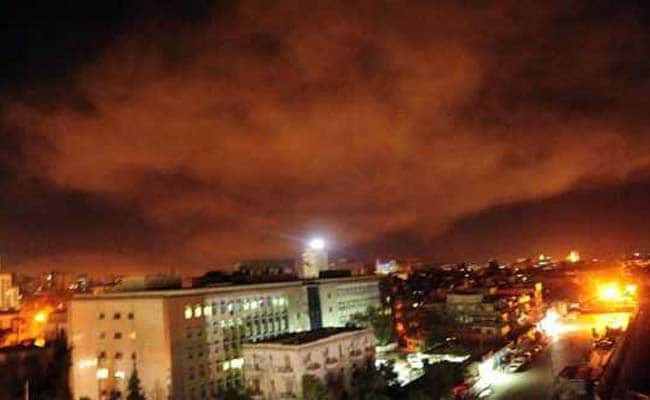
Syria strikes: Jim Mattis asked the international community to "urgently" end Syria's civil war (AFP)
A quick series of US, French and British air strikes in Syria were designed to send a "clear message" to President Bashar al-Assad and stop his chemical weapons program, US Defense Secretary Jim Mattis said Friday.
The Pentagon chief stressed the strikes were carefully calibrated to provide a strong response to a suspected chemical attack, but avoid pulling the West into Syria's civil war.
"The targets tonight again were specifically designed to degrade the Syrian war machine's ability to create chemical weapons and to set that back," Mattis said.
"There were no attempts to broaden or expand that target set."
The air strikes at multiple targets began around 9:00 pm Eastern Time (0100 GMT) and saw US, French and British assets firing missiles at the Assad regime's chemical production facilities.
President Donald Trump's decision to strike Syria in response to a suspected chemical attack came a year after he ordered military action against Assad following a deadly sarin gas attack on the rebel-held town of Khan Sheikhun.
"Clearly, the Assad regime did not get the message last year," Mattis said.
"This time, the allies struck harder. We sent a clear message to Assad," he added, noting that double the number of weapons were deployed compared to last year, when 59 Tomahawk cruise missiles were fired at Shayrat air base.
The air strikes appeared to last about an hour. Mattis said no additional attacks were planned, though Trump earlier suggested the strikes could last longer.
 "It is time for all civilized nations to urgently unite in ending the Syrian civil war by supporting the United Nations backed Geneva peace process," Mattis said, noting he expected Russia and other Assad backers to pursue a "significant disinformation campaign."
"It is time for all civilized nations to urgently unite in ending the Syrian civil war by supporting the United Nations backed Geneva peace process," Mattis said, noting he expected Russia and other Assad backers to pursue a "significant disinformation campaign."
General Joe Dunford, who is chairman of the Joint Chiefs of Staff, said the US chose targets to avoid hitting Russian forces.
The US military warned Russia of areas it would be operating in, but did not coordinate planning or targets, Dunford said.
Dunford added the precision strikes hit three targets -- a scientific research center near Damascus, a storage facility and command post also near the capital and a chemical weapons storage facility near Homs.
Syrian surface to air missile batteries had attempted to fire back, but there were no initial reports of any allied losses, he said.
Mattis and Dunford were joined at the Pentagon podium by British and French top officers.
(Except for the headline, this story has not been edited by NDTV staff and is published from a syndicated feed.)
The Pentagon chief stressed the strikes were carefully calibrated to provide a strong response to a suspected chemical attack, but avoid pulling the West into Syria's civil war.
"The targets tonight again were specifically designed to degrade the Syrian war machine's ability to create chemical weapons and to set that back," Mattis said.
"There were no attempts to broaden or expand that target set."
The air strikes at multiple targets began around 9:00 pm Eastern Time (0100 GMT) and saw US, French and British assets firing missiles at the Assad regime's chemical production facilities.
President Donald Trump's decision to strike Syria in response to a suspected chemical attack came a year after he ordered military action against Assad following a deadly sarin gas attack on the rebel-held town of Khan Sheikhun.
"Clearly, the Assad regime did not get the message last year," Mattis said.
"This time, the allies struck harder. We sent a clear message to Assad," he added, noting that double the number of weapons were deployed compared to last year, when 59 Tomahawk cruise missiles were fired at Shayrat air base.
The air strikes appeared to last about an hour. Mattis said no additional attacks were planned, though Trump earlier suggested the strikes could last longer.

A photo of the US-led strikes on the outskirts of Damascus (AFP)
General Joe Dunford, who is chairman of the Joint Chiefs of Staff, said the US chose targets to avoid hitting Russian forces.
The US military warned Russia of areas it would be operating in, but did not coordinate planning or targets, Dunford said.
Dunford added the precision strikes hit three targets -- a scientific research center near Damascus, a storage facility and command post also near the capital and a chemical weapons storage facility near Homs.
Syrian surface to air missile batteries had attempted to fire back, but there were no initial reports of any allied losses, he said.
Mattis and Dunford were joined at the Pentagon podium by British and French top officers.
(Except for the headline, this story has not been edited by NDTV staff and is published from a syndicated feed.)
Track Latest News Live on NDTV.com and get news updates from India and around the world

